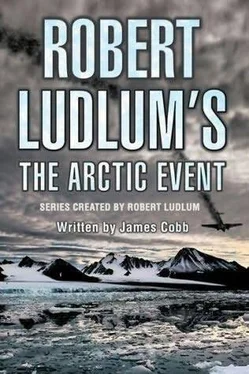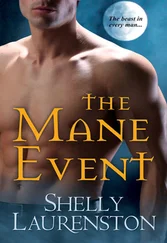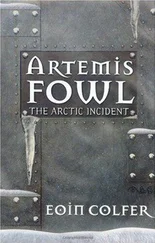“Just making sure,” a second lighter voice replied.
Smith realized that his head was pillowed on a rolled sleeping bag. Opening his eyes, he found Valentina Metrace kneeling beside him, her parka hood thrown back and ice crystals glittering like stars in her black hair. She smiled down into his face and quirked one of her expressive eyebrows at him.
Smyslov was looking over her shoulder, grinning as well. Smith realized he was lying on the deck in the forward compartment of the bomber. He was vague for a moment on just what they all were doing there; then full memory came crashing back.
“Damn it, Val! What do you think you’re doing?”
Both brows lifted. “So I’m enjoying my work?”
“That’s not what I mean!” he exclaimed, struggling to sit up. “This plane is a hot zone! There’s a contaminant-”
“Easy, Jon, easy,” the historian replied, holding him down gently with her hands on his shoulders. “There is no contaminant. You’re fine, we’re fine, and the plane is fine.”
“This is true, Colonel,” Smyslov interjected wryly. “I told you before, barring two tons of weaponized anthrax, there is nothing the least bit dangerous aboard this aircraft.”
Smith sank back and found he was still in most of the MOPP suit. Beyond the glare of the electric lantern that filled the cockpit, he could see a lingering trace of daylight through the windscreen. He must have been unconscious for only a matter of a few minutes. “Then what the hell did happen to me?”
“You almost protected yourself to death.” Smyslov held up the hood of the MOPP suit. “It’s cold in here. The moisture in your breath condensed and froze in the filters of your breathing mask. It gradually cut off your air.”
Valentina nodded. “Something similar happened in Israel during the first Gulf War. During the SCUD bombardment, when it was feared that Saddam might be using nerve gas, a number of Israeli citizens suffocated because they forgot to remove the filter caps on their gas masks. You were rebreathing your own carbon dioxide. Only with you the effect must have come on so gradually that you didn’t notice the buildup.”
Smith looked back over his clearing memories. “Yes. When I started to have breathing problems I first thought I was just having a bad attack of claustrophobia. Then I thought…”
“We know what you thought,” Valentina said softly. “You started to report the symptomology of your own death. But when you began to give us a very good clinical description of a man dying of suffocation, we realized what was going on. We tried to tell you to take off your mask, but you were too far gone to understand.”
She nodded toward the glassed-in nose of the bomber. “We came in through the cockpit window, and Gregori dove into the bomb bay and hauled you out. A little mouth-to-mouth resuscitation, and here you are.”
Smith grimaced. “Pardon me while I feel incredibly stupid.”
“I shouldn’t, Jon,” Valentina replied soberly. “I can’t imagine what it must have been like, climbing into that chamber of horrors. Just looking through that hatch was enough to make my skin crawl.” The historian shook her head in profound distaste. “I love fine weapons, but that…thing…isn’t a weapon; it’s a nightmare.”
“I’m not going to argue the point.” Smith smiled up at her. “I suppose I should be making a stink over you and the major for disobeying my direct orders, but I can’t seem to work up much enthusiasm for it. Thank you, Val.”
He extended a hand past her to Smyslov. “And thank you, Major.”
The Russian gripped it firmly. “It is the duty of a good subordinate to point out factors in a situation possibly overlooked by his superior,” he quoted, still grinning.
Smith tried to sit up again, this time succeeding with only a hint of dizziness. His strength seemed to be returning rapidly. “Well, we’ve got some good news and bad news. The bad news is that we still have the anthrax to deal with. The good news is that the containment vessel seems to be intact and undamaged. Just in case, we’ll stay on the antibiotics, but I don’t think we have any spore spillage to contend with. Val, how did-”
She stood up abruptly, giving Smith a sharp but seemingly accidental bump as she got to her feet. “Thank God for that at least,” she chattered on. “Do you think it’s safe to fort up in the fuselage for tonight? It sounds like the weather is kicking up a bit outside.”
“Yes…I think that might be a good idea,” Smith replied. “I suspect it will feel a little odd camping on top of a mound of anthrax, but I think it should be safe enough. What do you say, Major?”
Smyslov shrugged. “I think it will still be bloody cold in here, but I think it will also be better than a tent out on that stinking glacier. I think we’d do better in the aft compartment though.”
“Marvelous!” Valentina said, offering her hand to Smith. “Let’s get our gear together and start playing house. I could use a dollop of that medicinal whisky you promised.”
Smith accepted her hand and heaved himself off the deck. “Now that you mention it, so could I.”
Seated on the bare springs of the starboard crew bunk, Smith scowled at the walkie-talkie in his hand. “Wednesday Island Station, Wednesday Island Station. This is crash site, crash site. Randi, can you read me? Over.”
The little SINCGARS Leprechaun tactical transceiver hissed and spat back in his face. “Isn’t that just the way of it,” Smith said in disgust. He snapped off the radio and folded the antenna back into the casing. “You can communicate instantly with the farthest corner of the world except for when you actually need to talk with someone.”
“There is an entire mountain between us and the station.” Sitting cross-legged beside the tiny pack stove, Valentina carefully dropped a ball of hard-packed snow into the pan of water steaming atop it. Beyond melting a foot-wide circle in the frost on the overhead of the crew’s quarters, the little fuel-pellet burner was incapable of measurably affecting the temperature within the compartment, but it could produce hot water for an MRE and to refill the team’s canteens.
To save their batteries, the only illumination in the compartment came from a pair of chemical light sticks clipped to the bunk frames, the soft, all-encompassing green glow giving an impression of warmth.
The fuselage at least provided still air shelter from the wind whining across the glacier. The environment within the wreck would at least be tolerable for the night.
“What bunk do you want, Professor?” Smyslov asked, detaching his sleeping bag from his pack frame. “Ladies have first choice.”
“Thank you, kind sir,” Valentina replied. “But please indulge yourself. I’m taking the deck.”
“I’m doing the same,” Smith added, taking the last swallow of coffee from his canteen cup. “They apparently built aviators on a small scale in those days.”
“As you wish.” Smyslov started to unroll his sleeping bag into the lower port-side bunk. “Tell me, Colonel, now we know we do have anthrax to deal with. How do we proceed?”
“Well, I think your people had the right idea; we just take it a step farther. Since we still have full containment, I’d say we simply bring in a demolition team and pack the fuselage with a couple of tons of thermite and white phosphorous. We incinerate the whole damn thing right where it sits.”
“We most definitely do not!” Valentina exclaimed, looking up from the stove.
“Why not?” Smith asked, puzzled. “If we can just concentrate enough heat rapidly enough around that casing, we should be able to burn every spore before there’s any chance for them to spread.”
“Oh, good Lord! The blind who will not see!” She gestured expressively around the compartment. “Given its superb condition, this plane is a historic treasure! Come spring, if we can get an ice breaker and a helicrane in here, we could lift it off the glacier essentially intact! It could be restored. In fact…”
Читать дальше












